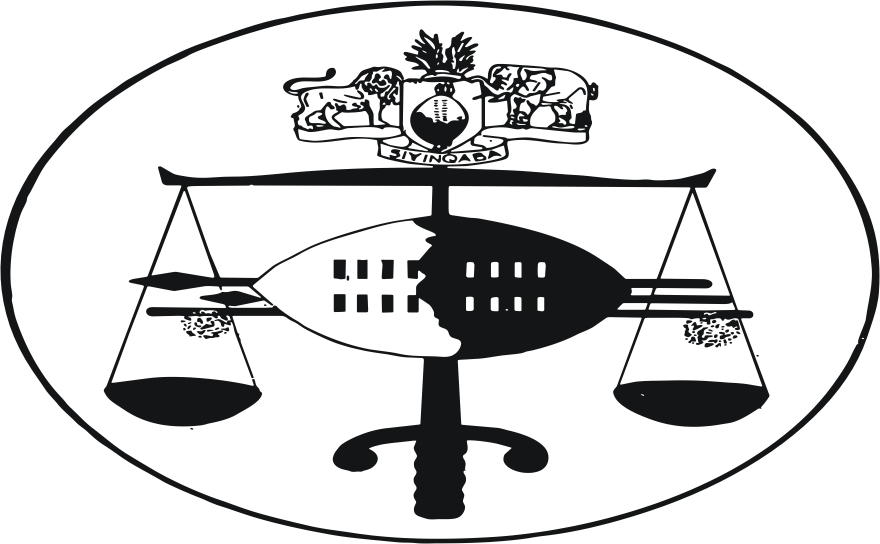
IN THE HIGH COURT OF SWAZILAND
JUDGMENT
Civil Case No: 1177/14
In the matter between
NKOSINATHI SIMELANE 1st APPLICANT
NCAMSILE SIMELANE 2nd APPLICANT
SIBONGILE SIMELANE 3rd APPLICANT
And
THE MINISTER OF FINANCE 1ST RESPONDENT
THE PRINCIPAL SECRETARY
MINISTRY OF FINANCE 2ND RESPONDENT
THE ATTORNEY GENERAL 3RD RESPONDENT
ART SIGNS (PTY) LTD 4TH RESPONDENT
NOMATHEMBA SIMELANE 5TH RESPONDENT
THE CHIEF JUSTICE MICHAEL RAMODIBEDI 6TH RESPONDENT
JUDGE ESTHER OTA 7TH RESPONDENT
JUDGE BHEKI MAPHALALA 8TH RESPONDENT
JUDGE AHMED MOOSA EBRAHIM 9TH RESPONDENT
JUDGE STANLEY ALFRED MOORE 10TH RESPONDENT
JUDGE DR. SETH TWUM 11TH RESPONDENT
JUDGE EMMANUEL AGIM 12TH RESPONDENT
JUDGE PHILIP LEVINSOHN 13TH RESPONDENT
JUDGE DR. BENJAMIN ODOKI 14TH RESPONDENT
THE MINISTER OF JUSTICE 15TH RESPONDENT
THE PRIME MINISTER 16TH RESPONDENT
THE JUDICIAL SERVICE COMMISSION 17TH RESPONDENT
Neutral citation: Nkosinathi Simelane & 2 Others v The Minister of Finance & 16 Others (1177/14) 2014 [SZHC] 340
(30 September 2014)
Coram: M. S. SIMELANE J, J. M. MAVUSO AJ
B. S. DLAMINI AJ,
Heard: 26 September 2014
Delivered: 30 September 2014
Summary: Constitutional Law – Independence of the Judiciary – Constitutionality of Legal Notice 177 of 2013 – remedial measures on declaration of invalidity – reading-in severance – application granted
Judgment
THE COURT
[1] The Applicants seek to strike down Legal Notice No. 177 of 2013. For this reason they approached the Court with an application wherein they seek the following substantive relief:-
2.1 That the Second Schedule of Legal Notice no. 177 of 2013 be set aside.
2.2 And/or alternatively it be held to be unconstitutional to limit the sitting allowances to ad hoc judges for only two sessions per year.
2.3 Any gazette or legal Notice issued by the Judiciary limiting the sittings of the Supreme Court to two sessions in compliance with Legal Notice No. 177 of 2013 be set aside and held to be unconstitutional.
2.4 The 1st and/or 2nd Respondent be compelled to comply with Section 141 (6) and (7) read with subsection (5) thereto of the Constitution of the Kingdom of Swaziland Act 1/2005 in remunerating Judges of the Supreme Court.
2.5 That 1st and/or 2nd Respondents be compelled to pay the sitting allowances of the Supreme Court Judges by 4th and 5th Respondents under Supreme Court case no. 26/14 to be enrolled before the November 2014 session in line with the provisions of the Swaziland Constitution of section 141, 201, 202 and 208.
2.6 That in the event the 1st and/or 2nd Respondents refuse and/or have not paid the allowances from the consolidated fund before the next budget debate for the Kingdom of Swaziland, the remuneration or allowances thereof be paid directly from the pockets of the said 1st and 2nd Respondents in line with the allowance amounts as they stood before the promulgation of Legal Notice No. 177 of 2013 as a civil proven debt to the Honourable Judges of the Supreme Court hearing appeal number 26/14 to be recovered by a Writ of execution.
2.7 Alternatively to the above, the Second Schedule of Legal Notice No. 177 of 2013 be read as including the permanent Justices of the Supreme and/or Appeal Courts of the Kingdom of Swaziland.
3. Costs of suit in the case of opposition.
4. Further and/or alternative relief.
[2] It is common cause that the 4th and 5th Respondents under oath withdrew from these proceedings per paragraphs 3.2, 3.3 read with paragraphs 4.7 and 4.8 of the fifth Respondent’s affidavit. It is also common cause that the 9th to 14th Respondents were struck off as parties in the cause, hence they do not feature in the matter.
[3] Let us first deal with the preliminary issue of locus standi raised by learned Counsel for the 1st and 2nd Respondents before we get into the substance of this application
[4] The question of locus standi simply denotes legal capacity to sue. Does a litigant have standing to launch the proceedings.? It is the right or competence to institute proceedings in a Court for redress or assertion of a right enforceable at law.
[5] Mr Vilakati for 1st, 2nd and 3rd Respondents has argued that the Applicants lack the requisite standing because, according to him, they have no business whatsoever with the assailed Legal Notice which concerns Judges of the Supreme Court and their allowances. As a consequence and in addition to the above, he goes on to argue that the Applicants are not entitled to the relief they seek.
[6] With respect, this argument is seriously flawed. This is because it completely loses sight of the fact that the issue here is that the Applicants are parties to an appeal which they want heard urgently, considering the nature of the issues therein and which hearing is being precluded by Legal Notice No. 177/2013. They contend that the assailed Legal Notice is unconstitutional because it violates their fundamental right to access to Court for a fair and speedy trial within a reasonable time as preserved by Section 21 (1) of the Constitution.
[7] It seems to us that the Applicants have locus standi in these circumstances, pursuant to Section 35 (1) and (2) of the Constitution Act, which postulate as follows:-
“35.(1) Where a person alleges that any of the foregoing provisions of this Chapter has been, is being or is likely to be, contravened in relation to that person or a group of which that person is a member (or, in the case of a person who is detained, where any other person alleges such a contravention in relation to the detained person) then, without prejudice to any other action with respect to the same matter which is lawfully available, that person (or that other person) may apply to the High Court for redress.
(2) The High Court shall have original jurisdiction-
(a) to hear and determine any application made in pursuance of subsection (1);
(b) to determine any question which is referred to it in pursuance of subsection (3);
and may make such orders, issue such writs and make such directions as it may consider appropriate for the purpose of enforcing or securing the enforcement of any of the provisions of this Chapter.”
[8] It is pertinent to state here, that the fundamental Human Rights to which Section 35 above relates, encompass all humanity. They are rights attaching to a man as a man because of his humanity. They are thus common to all human beings and must be clearly distinguished from civil rights, economic rights etc. Therein lies the Applicants’ locus standi. Viewed in this way we are satisfied that they have direct and substantial interest in the matter. See Dalrymple N Colonial Treasurer 1910 TS 372 at 379. The point taken on locus standi fails and is dismissed.
BACKGROUND
[9] The facts of this case briefly stated are as follows. The 2nd and 3rd Applicants were married to the late Simon Mandlenkhosi Simelane who died on the 23rd January 2014. The deceased was the owner of the 4th Respondent. The 1st Applicant and 5th Respondent are children of the deceased. The 1st and 2nd Applicants are co-executors in the estate of the deceased as per "Annexure A.
[10] On 14 March 2014, the 4th and 5th Respondents who have withdrawn from this application, initiated an ex parte application before the High Court wherein they sought the following prayers:-
“1. Dispensing with the forms of service and the time limits provided by the Rule of this Honourable Court and hearing this matter as one of urgency;
2. Condoning the Applicants non-compliance with the Rules of this Honourble Court.
3. That a rule nisi be and is hereby issued calling upon the Respondents to show cause, on a date to be determined by this Honourble Court, why the following order should not be made final;
3.1 Interdicting and restraining the 1st Respondent from exercising any directorship and/or managerial authority over the 1st Applicant on and off, the Applicant’s place of business situate on Plot 800, First Street, Matsapha Industrial Sites, in the Manzini district, Kingdom of Swaziland;
3.2 Interdicting and restraining the 1st Respondent from transacting and/or holding out himself to be a member of the 1st Applicant;
3.3 Interdicting and restraining the 1st Respondent or anyone who acts on his authority from engaging in any dealings for and on behalf of the 1st Applicant.
3.4 Interdicting and restraining the 1st Respondent from making withdrawals of monies held by the 1st Applicant at Nedbank Swaziland Limited, Manzini Branch;
3.5 Directing the 1st Respondent to disclose the authority under which he acts when withdrawing monies from the 1st Applicant’s bank account and making payments on behalf of the 1st Applicant;
3.6 Directing the 1st Respondent to forthwith remit an estimated amount of E72, 627.72 (Seventy Two Thousand Six Hundred and Twenty Seven Emalangeni Seventy Two Cents) to the 2nd Applicant;
3.7 Directing the 1st Respondent to forthwith handover all the documents and car keys belonging to the 1st Applicant taken unlawfully from the 1st Applicant’s place of business on Plot 800, First Street, Matsapha Industrial Sites, in the Manzini district Kingdom of Swaziland;
Make: Peugeot 207
Year of Manufacture: 2007
Engine No: 10FKAC0051307
Chassis No: VF3WM5FYC33871884
Registration No: DSD 502 AM
3.8 Directing the 1st Respondent to account on the expenditure of the amount of E166, 000.00 (One Hundred and Sixty Six Thousand Emalangeni) withdrawn from the 1st Applicant’s bank account in February 2014;
3.9 Directing that a Notice to the Public be placed in the local newspaper circulating within the Kingdom of Swaziland advising the public that the 1st Respondent has no authority to act for and on behalf of the 1st Applicant.
4. That prayers 3.1, 3.2, 3.3, 3.4, 3.5, 3.6, 3.7 and 3.9 operate as an interim order with immediate effect pending finalzation of the matter.
5. That the Respondents should pay the costs of suit in the event of opposition of this application at the scale of attorney and own client;
6. Granting such further and/or alternative relief as the Honourable Court deems meet.”
[11] On 10 June 2014 the High Court dismissed the application with costs. The 4th and 5th Respondents filed an appeal at the Supreme Court per Annexure B, as they were not content with the High Court judgment. The foregoing is the genesis of this application.
[12] THE MERITS
The Applicants’ case is that they are desirous to prosecute the appeal in a special sitting of the Supreme Court. They argue that they have written through their attorney to His Lordship the Honourable Chief Justice in an endeavor to have a special sitting of the Supreme Court but have been advised by The Chief Justice that they cannot have a special sitting of the Supreme Court as same is humstrung by Legal Notice No. 177 of 2013 which was issued by the Principal Secretary in the Ministry of Finance. The said letter written by learned Counsel for the Applicants Mr M. Simelane, reads as follows:-
“MES/ss/E14/14
13th August 2014
The Honourble Chief Justice
Of the Kingdom of Swaziland
High Court
Dear Sir,
RE: ART SIGNS (PTY) LTD & ANOTHER v NKOSINATHI SIMELAND & 4 OTEHRS – SUPREME COURT CASE NO. 26/14
1. The above matter refers.
2. We act for NKOSINATHI SIMELANE, NCAMSILE SIMELANE and SIBONGILE SIMELANE who are the Respondents in the Appeal.
3. In the middle of the appeal is the Appellant Company whose sole shareholder and bank signatory MR. SIMON MANDLENKHOSI SIMELANE passed away on 23rd JANUARY 2014 thus locking away all the funds of the company pending finalization of the matter.
4. The company is unable to pay its staff salaries, suppliers and rent. It faces closure.
5. The 2nd Appellant has failed to file a record, heads of arguments and or to approach your kindself to have the matter enrolled at an earlier date after she lost the application she moved ex parte in the High Court. We have on the other hand prepared the Record and have filed the Respondent’s heads.
6. We have written several letters to her attorney but they are blocking all means to have the Appeal heard at the earliest.
7. Means to operate the bank account of the company are being blocked yet the 2nd Appellant has resigned from the company. Instead of concentrating on the Appeal she has however moved a High Court application to contest her resignation.
8. Enrolling the Appeal on an earlier date will solve the impasse because at the centre of the 2nd Appellant’s argument is that the company bank account must not operate because there is an Appeal that has been lodged despite not being involved in the day to day operation of the company.
9. She has not to date applied that she be given authority to operate the company whilst the Appeal is pending.
10. We therefore humbly request for an earlier date.
11. We are available on short notice to appear before you for any directive you may wish to stipulate. We hope the Appellant’s attorney will attend.
Yours faithfully
MBUSO E. SIMELANE & ASSOCIATES
Per:
Cc: Howe Masuku Nsibandze Attorneys
Mbabane
(LH/cv/A127)
Cc: The Attorney General
Mbabane
(AG3/CIV/1/14537)”.
[13] The Applicants’ argument before this Court is that the 1st and 2nd Respondents had no right in terms of Section 208 of the Constitution of Swaziland to issue the Second Schedule of Legal Notice No. 177 of 2013.
[14] It is further the Applicants’ case, that due to the unlawful conduct of the second Respondent, the right of the Applicants to have the appeal filed against them, enrolled and heard on an earlier date has been infringed by the said Legal Notice, contrary to Section 21 (1) of the Constitution. They argue that the Legal Notice takes away the allowance of the permanent Judges and limits the sessions of the Supreme Court to twice a year in May and November. This, they say infringes on the right to have the very urgent issues in the appeal determined expeditiously..
[15] 1st and 2nd Respondents argued au contraire that the application is without merit as it is a personal litigation that has nothing to do with Legal Notice No. 177 of 2013 which is on the prescription of salaries and allowances for Superior Court Judges.
[16] Furthermore, they contend that the effect of striking down Legal Notice No. 177 of 2013 is that there will be a constitutional crisis in that the Judicial Officers affected by and paid in terms of that notice will no longer be paid. They contend that the disruption to the administration of justice in Swaziland is self-evident.
[17] Having carefully considered the written and oral submissions before this Court, we are inclined to agree with the Applicants that Legal Notice No. 177 of 2013 is ultra vires the Constitution and thus null and void ab initio.
[18] For the avoidance of doubts Legal Notice No. 177 of 2013 reads as follows:-
“LEGAL NOTICE NO. 177, 2013
THE CONSTITUTION OF SWAZILAND ACT, 2005
THE PRESCRIPTION OF SALARIES AND ALLOWANCES OF OFFICERS OF THE SUPERIOR COURTS NOTICE, 2013
(Under section 208)
________
In exercise of the powers conferred by section 208 of the Constitution of Swaziland Act, 2005 the Minister of Finance issues the following Notice-
Citation and commencement
1. (1) This Notice may be cited as the Prescription of Salaries and Allowances of Officers of the Superior Courts Notice, 2013.
(2) This Notice shall come into force on the date of publication.
Prescription of salaries and allowances
2. Without prejudice to any other benefits conferred by any law, the holder of an office specified in the First and Second Schedule shall be paid not less than the salary or allowance or both (as the case may be) specified in relation to the holder, in the First or Second Schedule.
Pension
3. (1) A holder of an office specified in the First Schedule who is employed on permanent basis shall join the existing contributory pension schedule at prevailing Government rates.
(2) A holder of an office specified in the First Schedule who is on contract shall be paid a gratuity of twenty-five percent (25%) of the basic salary at the end of eh contract.
Revocation of legal notice
3. Legal Notice No. 171 of 2007 is revoked.
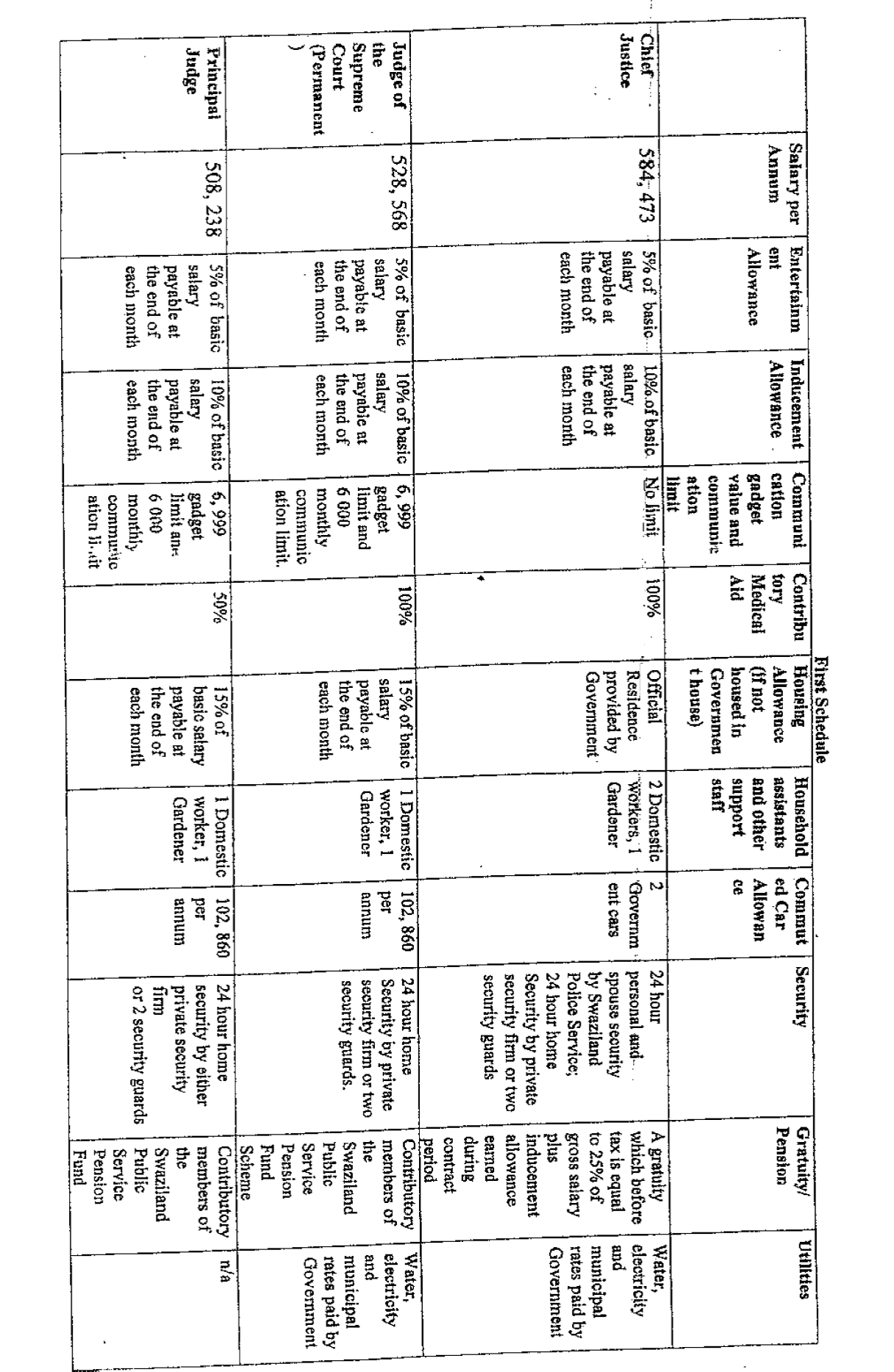
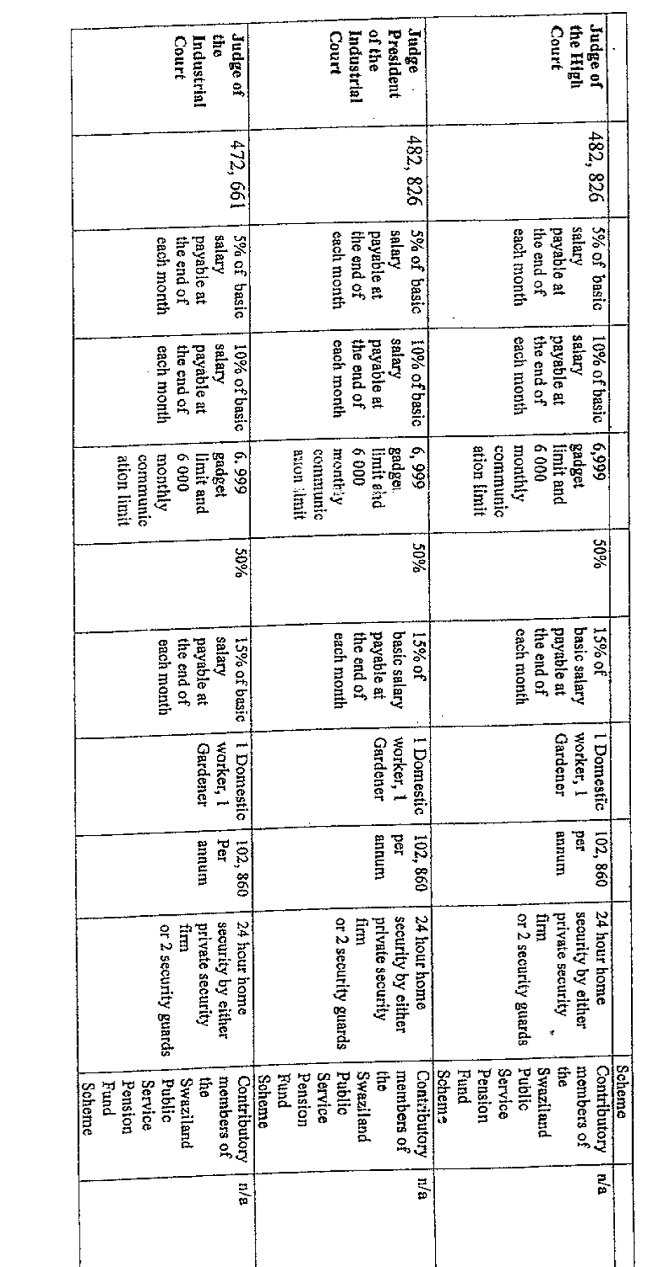
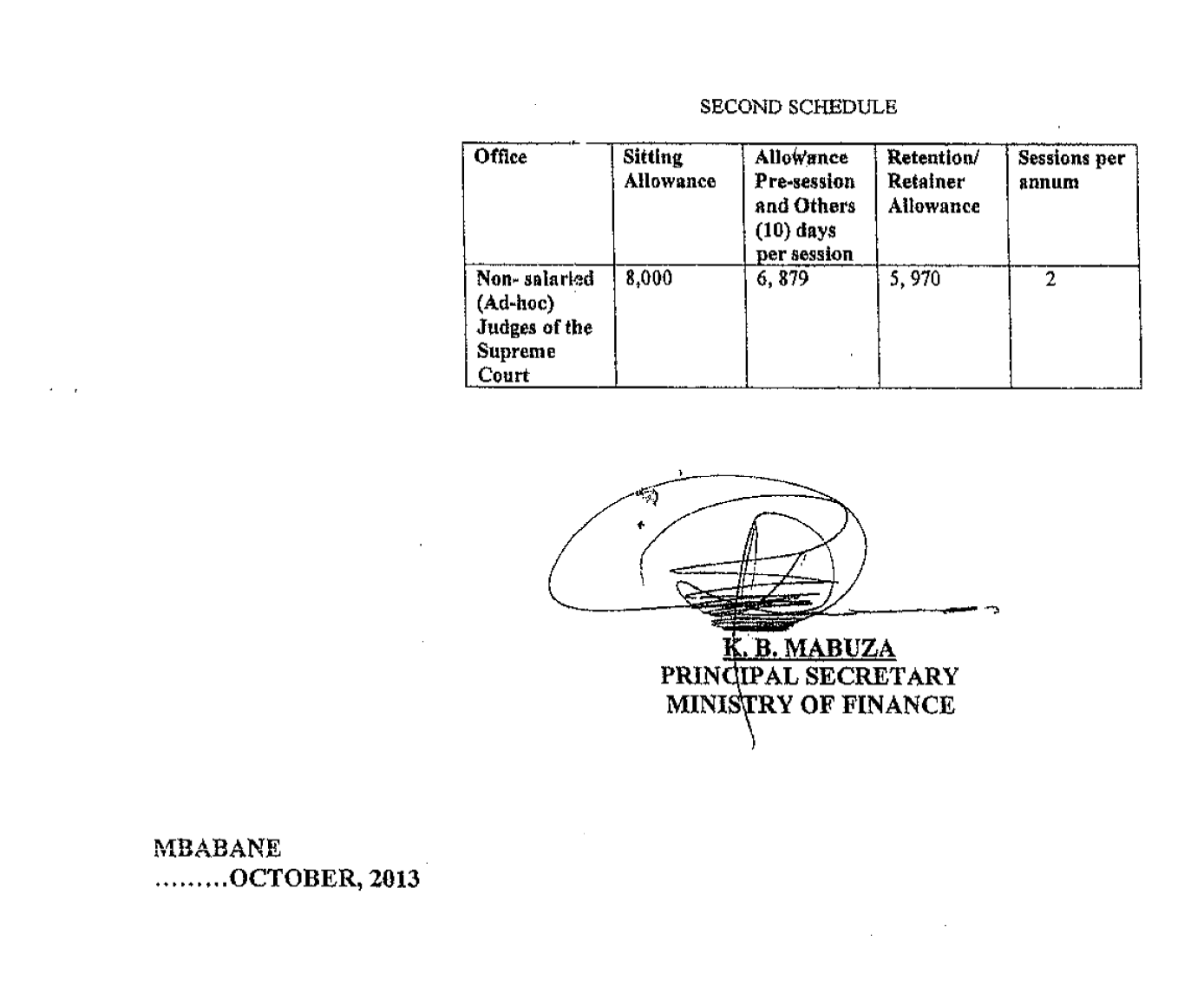
[19] The unconstitutionality of the Legal Notice in question is evident from the fact that it takes away some existing rights and entitlements of the salaried Supreme Court Judges. These include the Chief Justice, the resident Supreme Court Judges as well as the Industrial Court of Appeal Judges. What is not in issue is that these are benefits that the Judges have enjoyed from time immemorial as Judges of the Highest court of this country. It is an indisputable fact that the salaried Supreme Court Judges and the Chief Justice have always enjoyed both their salary as well as the sitting allowances in the Supreme Court. Similarly, the Chief Justice and the Industrial Court of Appeal Judges have always earned both salary and sitting allowances in that Court.
[20] The spirit of the assailed Legal Notice is thus an affront to the Independence of the Judiciary which Section 141 of the Constitution guarantees in the following words.
“Independence of the Judiciary
141. (1) In the exercise of the judicial power of Swaziland, the Judiciary, in both its judicial and other administrative functions, including financial administration, shall be independent and subject only to this Constitution, and shall not be subject to the control or direction of any person or authority.
(2) Neither the Crown nor Parliament nor any person acting under the authority of the Crown or Parliament nor any person whatsoever shall interfere with Judges or judicial officers, or other persons exercising judicial power, in the exercise of their judicial functions.
(3) All organs or agencies of the Crown shall give to the courts such assistance as the courts may reasonably require to protect the independence, dignity and effectiveness of the courts under this Constitution.
(4) A judge of a superior court or any person exercising judicial power, is not liable to any action or suit for any act or omission by that judge or person in the exercise of the judicial power.
(5) The administrative expenses of the Judiciary, including all salaries, allowances, gratuities and pension payable to, or in respect of persons serving in the Judiciary, shall be charged on the Consolidated Fund.
(6) The salary, allowances privileges and rights in respect of leave of absence, gratuity pension and other conditions of service of a Judge of a superior court or any judicial officer or other person exercising judicial power, shall not be varied to the disadvantage of that Judge or judicial officer or other person.
(7) The Judiciary shall keep its own finances and administer its own affairs, and may deal directly with the Ministry responsible for finance or any other person in relation to its finances or affairs.” (emphasis added.)
[21] It is clear from the language of Section 141 of the Constitution, that the Judiciary in all its affairs including its financial administration, is independent and not subject to the directions and control of any person or authority.
[22] In view of the above, the said Legal Notice is unlawful in that it infringes on the Independence of the Judiciary based on the fact that the Principal Secretary’s conduct is tantamount to her issuing orders to the Judiciary, to wit, that the Supreme Court shall have only two (2) Supreme Court sessions per year. What the Principal Secretary tends to do is to control and take away the Independence of the Judiciary which is not in consonance with the spirit of our Constitution, particularly, with regards to the Independence of the Judiciary.
[23] More to the above, is that the impugned Legal Notice also purports to vary the terms, privileges and rights of the Chief Justice, permanent Supreme Court Judges as well as the Industrial Court of Appeal Judges to their disadvantage. This is an affront to Section 141 (6) of the Constitution which we have set forth above in extenso.
[24] It is worthy of note that the Chief Justice, permanent Supreme Court Judges whether Ad hoc or resident and the Industrial Court of Appeal Judges by the tenor of Section 141 of the Constitution and all other previous Legal Notices have always enjoyed both their salaries and the sitting allowance, which Legal Notice No. 177 of 2013 seeks to take away. For example Legal Notice No. 171/2007 did not restrict the sessions of the Supreme Court Judges nor did it take away the allowances payable to any group of the permanent Supreme Court Judges. Legal Notice No. 171/2007 states as follows:-
“LEGAL NOTICE NO. 171 OF 2007
THE CONSTITUTION OF SWAZILAND ACT. 1968
THE PRESCRIPTION OF STATUTORY SALARIES AND ALLOWANCES OF OFFICERS OF THE SUPERIOR COURTS NOTICE . 2007
(Under Section 208)
In exercise of the powers conferred by Section 208 of the Constitution of Swaziland, 2005, the Minister of Finance hereby issues the following Notice.
Citation and Commencement
1. This Notice may be cited as the Prescription of Statutory Salaries and Allowances Notice, 2007, and shall be deemed to have come into force on the 1st April 2007.
Prescription of Salaries and Allowances
2. Without prejudice to any other benefits conferred by any law, the holder of an office specified in the first column of the Schedule shall be not less than the salary or allowance or both (as the case may be) specified in relation to the holder, in the second, third, fourth, fifth, sixth, seventh, eighth and ninth columns of the Schedule.
Revocation of Legal Notices
3. (1) Legal Notices No. 61 of 2006 is hereby repealed to the extent that, that Legal Notice affects olders of the post of Chief Justice.
(2) Legal Notice No. 164 of 2007 is hereby revoked from the date of its publication.
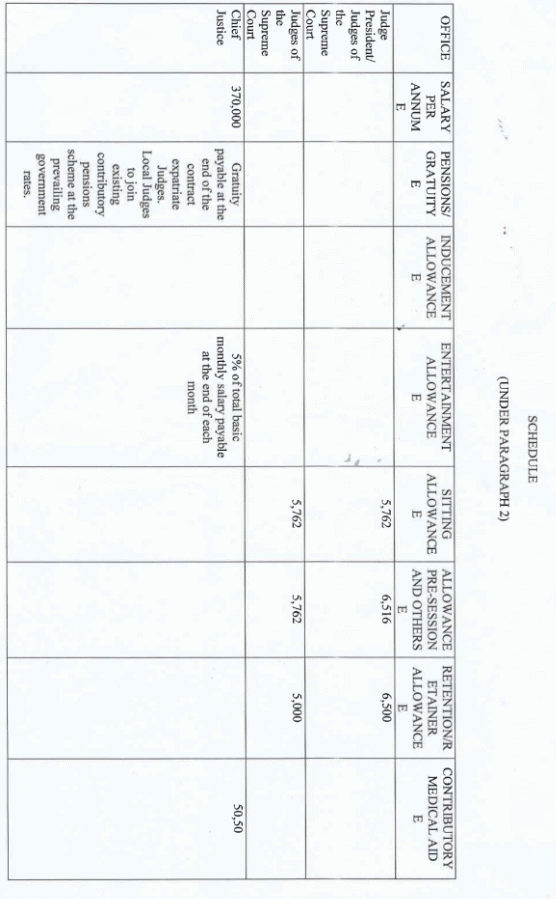
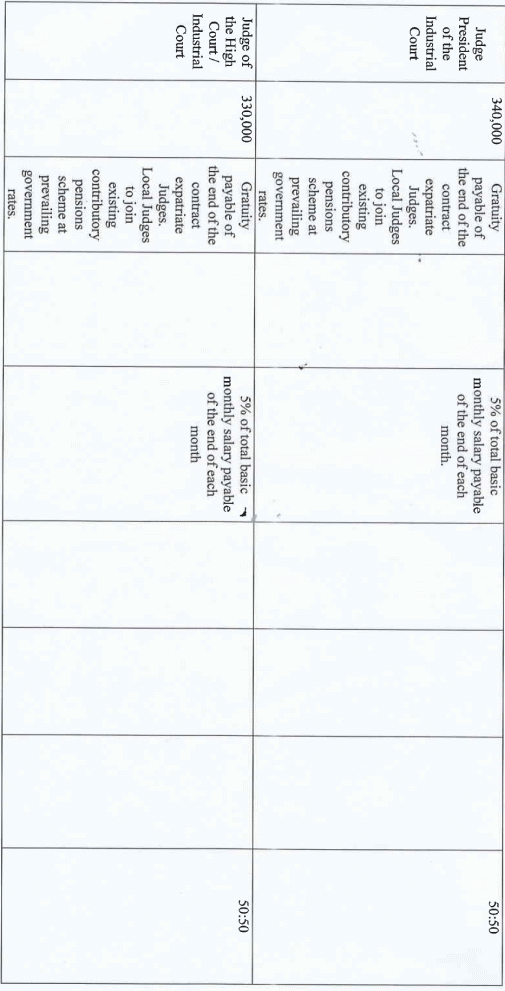
[25] We further note here that the asailed Legal Notice appears to be convoluted. This is because while a part of it takes away the allowances payable to the salaried Supreme Court Judges, Section 2 maintains the status quo. It provides that the Supreme Court Judges shall be paid both salary and allowance. We again quote same in extenso.
“2. Without prejudice to any other benefit conferred by any law, the holder of an office specified in the First and Second Schedule shall be paid not less than the salary or allowance or both (as the case may be) specified in relation to the holder, in the First and Second Schedule.”
[26] It is further crystal clear that when the said Legal Notice was issued no consultations whatsoever with the Judiciary was done by the ministry of Finance. This, we say based on the fact that the Principal Secretary has not adduced any evidence to the contrary. This is very absurd and such conduct does not augur well with the separation of powers of the Executive, Legislature and The Judiciary as enshrined in the Constitution.
[27] There is no doubt that the three (3) arms of Government, though independent, compliment one another. It is thus expedient, for the harmonious and smooth running of the affairs of Government, that due and proper engagements take place in the interest of upholding the Constitution
[28] It remains for us to emphasise that the Constitutional power to administer and supervise the Judiciary lies with the Chief Justice of Swaziland as the head of the Judiciary. This power is conferred on him by Section 139 (5) of the Constitution Act, which states as follows:-
“Subject to the provisions of the Constitution, the Chief Justice is the head of the Judiciary and is responsible for the administration and supervision of the Judiciary.”
[29] The foregoing section is backed up by Section 142 of the Constitution, which postulates thus:-
“Administrative functions of the Chief Justice
142. Subject to the provisions of this Constitution or any other law, the Chief Justice as head of the Judiciary may make rules for regulating the practice and procedure of the superior and surbordinate Courts, including the specialized and local Courts as well as powers of judicial officers.”
[30] It follows from the above that any other officer, whether from the Executive, Legislature or Judiciary, who purports to undertake this task as the Principal Secretary Finance did, is clearly interfering with the Judiciary unconstitutionally.
[31] The 1st Respondent Principal Secretary of the Ministry of Finance, one K.B. Mabuza, 1st and 2nd Respondents, the Minister of Finance, had no power or right in terms of Section 208 of the Constitution or any other law in Swaziland to issue the Second Schedule of the Legal Notice in issue, in these circumstances.
[32] It is trite that violations of the law constitute a ground for urgency. It is an indisputable fact that there are matters which are extremely urgent such as the one in casu that warrants the convening of a special Supreme Court sitting outside of the main sessions in May/November. It is paramount that we mention here that such appeals are brought at the instance of litigants or their counsel and not initiated by the judiciary.
[33] We are of the considered view that restricting the Supreme Court sessions to two (2) per annum has the direct impact of infringing on the rights of litigants to a speedy and fair hearing. We observe further that the deprivation of litigants of their right to expeditious dispensation of justice will have far-reaching negative repercussions economically and financially as it is the situation in the case in casu.
[34] Mr. Vilakati has argued that there are three (3) resident Supreme Court Judges who can hear any appeal at anytime. He had difficulty responding when tasked by the Court on how possible this is with the restriction of two (2) sessions imposed by the Principal Secretary. He could not assist the Court on how those Judges were to be paid. His only argument was that the salary for the resident Supreme Court Judges was exorbitantly increased to take care of the Supreme Court special sittings. This contention is rejected since no evidence has been adduced by the Respondents to support it.
[35] Even though we deem Legal Notice No. 177 of 2013 to be unconstitutional, we are mindful of the fact that to declare it unconstitutional in its entirety will cause constitutional a crisis. It would be prudent for this Court to read in the words proposed in the order into the Second Schedule of the Legal Notice No. 177 of 2013. This is so in order to remove the anomaly that purports to restrict the Supreme Court sessions to two per annum whilst taking away the allowances payable to the resident Supreme Court Judges. That is the more desirable remedy.
[36] As we have already interpreted the Second Schedule to Legal Notice No.177 of 2013 issued by the Ministry of Finance as not being in line with the Constitution, we must now decide how to remedy the prevailing situation. There are a number of remedial options that this Court can resort to and these options were clearly articulated in the local Supreme Court case of THE ATTORNEY GENERAL v MARY-JOYCE DOO APHANE, Civil Appeal Case No.12/2010 as follows:-
(a) Striking down
(b) Striking down and temporarily suspending the declaration of invalidity
(c) Reading down
(d) Reading in
(e) Severance
(f) Such other remedies as may be appropriate and which lie within the competence of the court.
[37] In choosing the most effective remedial action to be taken in this matter, we have sought guidance in the Canadian case of SCHACHTER v CANADA [1992] 2 S.C.R 679 where the following was stated;
“One important distinction exists between severing and reading in. In the case of severance, the inconsistent part of the statutory provision can be defined with some precision on the basis of the requirements of the Constitution. This is not always the case with reading in. In cases where the question of how the statute ought to be extended in order to comply with the Constitution cannot be answered with a sufficient degree of precision on the basis of constitutional analysis, the legislature and not the courts must fill in the gaps.
‘In determining whether reading in is appropriate, the question is not whether courts can make decisions that impact on budgetary policy but rather to what degree they can appropriately do so. A remedy which entails an intrusion into this sphere so substantial as to change the nature of the legislative scheme in question is clearly inappropriate. The court should consider whether the significance of the part which would remain is substantially changed when the offending part is excised. The problem with striking down only the inconsistent portion is that the significance of the remaining portion may change so markedly without the inconsistent portion that the assumption that the legislature would have enacted it is unsafe.’ ” [At pp 6-7]
[38] It is further stated by the Court in the Schachter case that;
“This same approach should be applied to the question of reading in since extension by way of reading in is closely akin to the practice of severance. The difference is the manner in which the extent of the inconsistency is defined. In the usual case of severance the inconsistency is defined as something improperly included in the statute which can be severed and struck down. In the case of reading in, the inconsistency is defined as what the statute wrongly excludes rather than what it wrongly includes. Where the inconsistency is defined as what the statute excludes, the logical result of declaring inoperative that inconsistency may be to include the excluded group within the statutory scheme. This has the effect of extending the reach of the statute by way of reading in rather than reading down.” [Underlining our emphasis]
[39] In a recent judgment of the High Court of Swaziland in WEZZY NDZIMANDZE AND 16 OTHERS v TITSELO DZADE NDZIMANDZE AND OTHERS [SZHC] (A 2014), the Court re-affirmed its authority to correct any piece of subordinate legislation that is not in conformity with the Constitution whilst paying particular attention to the Legislature’s autonomy. In holding that a particular provision of legislation is inconsistent with the Constitution and thus opting to either strike down or read in the offending part of the legislation, the Court by so doing, is by no means “legislating” but performing its constitutional mandate of “interpreting” the law so that it is in line with the purpose, objectives and intention of Parliament as stated in the supreme law of the land. Section 2 (1) of the Swaziland Constitution provides that;
“This Constitution is the Supreme Law of Swaziland and if any other law is inconsistent with this Constitution, that other law shall, to the extent of the inconsistency be void.”
[40] In Section 35 of the Constitution of Swaziland, it is stated that the High Court may;
“make such orders, issue such writs and make such directions as it may consider appropriate for the purpose of enforcing or securing the enforcement of any of the provisions of this Chapter.”
[41] In the case of DOO APHANE [supra], the Court referred to the “Bill of Rights Handbook” (5th Ed) at p.197 where it is stated that;
“Ideally speaking, a Court’s order must not only afford effective relief to a successful litigant, but also to all similarly situated people. This is the second factor that must be considered. As the Constitutional Court has stated, in constitutional cases there is ‘a wider public dimension. The bell tolls for everyone.’ (National Coalition for Gay and Lesbian Equality v Minister of Home Affairs (Note 24 above) paragraphs 82). This requires a consideration of the interests of all those who might be affected by the order, and not merely the interests of the parties to the litigation (Hoffman, note 25 above) paragraphs 42-43.
‘The third factor that is often referred to is the separation of powers and, flowing from it, the deference a court owes to the legislature when devising a constitutional remedy. Although it has refrained from laying down guidelines, the Constitutional Court has stated that deference involves ‘restraint by the Courts in not trespassing onto that part of the legislative field which has been reserved by the Constitution, and for good reason, to the Legislature’ (National Coalition Case). ’ ”
[42] We are of the considered view that we include the Chief Justice and all the salaried Judges of the Supreme Court who have been getting sitting allowances as well as the Industrial Court of Appeal Judges. They are all adversely affected by the impugned Legal Notice.
[43] Finally, before we draw the curtain on this judgment, we deem it expedient to pronounce on the conduct of the Principal Secretary of the Ministry of Finance in issuing the assailed Legal Notice. Her conduct is highly deprecated. An officer of her caliber should be above board. Her action has left much to be desired and is worthy of very strong reprehension. We say so because, she proceeded to issue a Legal Notice which she had absolutely no power to issue, purporting to derive such power from a non existent Minister, since Cabinet had been dissolved. We perceive that her sole purpose was to ridicule and malign the Judiciary and in the process bring the entire administration of justice into disrepute. Shockingly, she was well aware that she had no power to issue the Legal Notice in question. In this regard she stated the following in her opposing affidavit:-
“41. In the presence (sic) instance I made the subsidiary legislation out of practical necessity. His Majesty King Mswati III had ordered and commanded the dissolution of the Cabinet of Ministers with effect from 16 September 2013. There would be no Cabinet until about mid-November 2013. It was impossible for the Minister to exercise the power personally. It was expedient and in the public interest for me to make subordinate legislation. A copy of the Dissolution of Cabinet Notice, 2013 is attached marked “KM8”.
.
.
.
44. ...The power to prescribe salaries and allowances for Judges through delegated legislation has not been conferred on the Minister to the exclusion of officials in the Ministry of Finance. In the case at hand I made the delegated legislation out of practical necessity because there was no Prime Minister or other Minister who could legislate. Again, this was without objection from those directly affected and continues to be the status quo.”
[44] This explanation is certainly unacceptable and must be strongly inveighed.
[45] The Court issues an order in the following terms:-
[46] COURT ORDER
(a) The application is granted as prayed in terms of prayer 2.7 of the Notice of Motion, with the following alterations to the Second Schedule of Legal Notice No. 177 of 2013.
(i) The following words shall be read-in in the Second Schedule under the heading “Office”:-
“The Chief Justice,” “Salaried Supreme Court Judges who have been earning sitting allowances” and “the Industrial Court of Appeal Judges.”
(ii) Under the last column to the Second Schedule the following words are hereby severed, namely, “sessions per annum” and the figure “2”.
(b) There shall be no order as to costs.
--------------------------
M. S. SIMELANE J
-------------------------
J. M. MAVUSO AJ
--------------------------
B. S. DLAMINI AJ
For the Applicants: Mr. M .E. Simelane
For the 1st, 2nd and 3rd Respondents: Mr. M. Vilakati
Amicus Curie: Mr. L. Howe
33